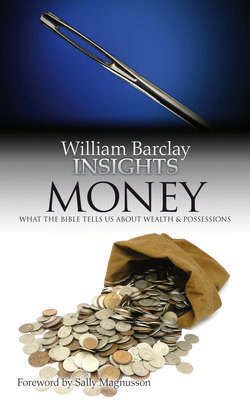Читать книгу Insights: Money - William Barclay - Страница 8
На сайте Литреса книга снята с продажи.
ОглавлениеThe peril of the love of money
1 Timothy 6:9–10
Those who wish to be rich fall into temptation and a snare, and into many senseless and harmful desires for the forbidden things, desires which swamp men in a sea of ruin and total loss in time and in eternity. For the love of money is a root from which all evils spring; and some, in their reaching out after it, have been sadly led astray, and have transfixed themselves with many pains.
HERE is one of the most misquoted sayings in the Bible. Scripture does not say that money is the root of all evil; it says that the love of money is the root of all evil. This is a truth of which the great classical thinkers were as conscious as the Christian teachers. ‘Love of money’, said the Greek philosopher Democritus, ‘is the metropolis of all evils.’ Seneca speaks of ‘the desire for that which does not belong to us, from which every evil of the mind springs’. ‘The love of money’, said the Cynic teacher Diogenes of Sinope, ‘is the mother of all evils.’ Philo, the Jewish writer, spoke of ‘love of money which is the starting-place of the greatest transgressions of the law’. The Greek writer Athenaeus, who lived in the second century, quotes a saying: ‘The belly’s pleasure is the beginning and root of all evil.’
Money in itself is neither good nor bad, but the love of it may lead to evil. With it, people may selfishly serve their own desires; with it, they may answer the cry of their neighbour’s need. With it, they may advance the path of wrongdoing; with it, they may make it easier for other people to live as God meant them to do. Money is not itself an evil, but it is a great responsibility. It has power for good and power for evil. What then are the special dangers involved in the love of money?
(1) The desire for money tends to be a thirst which cannot be satisfied. There was a Roman proverbial saying that wealth is like sea water; far from quenching thirst, it intensifies it. The more we get, the more we want.
(2) The desire for wealth is founded on an illusion. It is founded on the desire for security; but wealth cannot buy security. It cannot buy health, nor real love, and it cannot preserve from sorrow and from death. The security which is founded on material things is doomed to failure.
(3) The desire for money tends to make people selfish. If they are driven by the desire for wealth, it is nothing to them that someone has to lose in order that they may gain. The desire for wealth fixes people’s thoughts upon self, and others become merely means or obstacles in the path to their own enrichment. True, that need not happen; but in fact it often does.
(4) Although the desire for wealth is based on the desire for security, it ends in nothing but anxiety. The more people have to keep, the more they have to lose, and the tendency is for them to be obsessed by the risk of loss. There is an old story about a peasant who performed a great service to a king, who rewarded him with a gift of much money. For a time, the man was thrilled; but the day came when he begged the king to take back his gift, for into his life had entered the hitherto unknown worry that he might lose what he had. John Bunyan was right:
He that is down needs fear no fall.
He that is low, no pride;
He that is humble ever shall
Have God to be his guide.
I am content with what I have,
Little be it or much;
And, Lord, contentment still I crave,
Because Thou savest such.
Fullness to such a burden is
That go on pilgrimage;
Here little, and hereafter bliss,
Is best from age to age.
(5) The love of money may easily lead people into wrong ways of getting it, and therefore, in the end, into pain and remorse. That is true even physically. They may so drive their bodies in their passion to get that they ruin their health. They may discover too late what damage their desire has done to others and be saddled with remorse.
To seek to be independent and prudently to provide for the future is a Christian duty, but to make the love of money the driving force of life cannot ever be anything other than the most perilous of sins.
